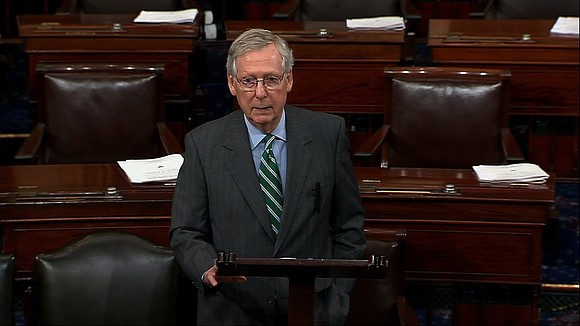One Week. 52 Senators. Can Mitch McConnell Get It Done?
CNN/Stylemagazine.com Newswire | 6/23/2017, 8:48 a.m.
By MJ Lee and Lauren Fox
CNN
WASHINGTON (CNN) -- The math isn't there yet for Mitch McConnell.
Within hours of the Senate majority leader unveiling a long-anticipated health care bill on Thursday, four of his Republican colleagues were quick to put a damper on things: "We are not ready to vote for this bill," the group said in a joint statement.
The swift rejection may be a negotiating ploy, but the public nature of it is a reminder for McConnell of the deep reservations running through his own conference on a proposal that conservatives do not believe goes far enough to repeal Obamacare -- and the monumental challenge that lies ahead as he looks for 50 "yes" votes.
Over the next few days, McConnell needs to determine what concessions he can make to sway at least two of the four conservative senators -- but do so without losing support from the more moderate wing of the Senate, some of whom face tough re-elections next year.
Sen. Ted Cruz, who along with Sens. Rand Paul, Mike Lee and Ron Johnson said they could not support the bill in its current form, told reporters Thursday afternoon that the real negotiations have only just begun -- and suggested he would be willing to swallow elements he doesn't care for.
"Everyone's going to have to give. That's the only way you can get at least 50 out of 52 Republicans," Cruz said. "We have a very narrow majority."
But McConnell doesn't have much time.
He is aiming for a vote before members leave town ahead of the July 4 recess, giving Senate Republicans have just a handful of days to study a 142-page bill. And they will have even less time to consider the Congressional Budget Office's score of the bill -- and dramatic headlines of what it means for Americans' health care coverage -- once it's released early next week.
Many of McConnell's colleagues, however, are confident that if anyone can find 50 votes, it's their majority leader -- a political tactician who knows Senate procedure inside and out.
"Listen, I think Mitch's role is to choose to take a vote on this. I think that's what he's doing he's gone through a very exhaustive process of the input, and he's come up with a blue print that can still be amended and probably will be in reconciliation," said North Carolina Republican Sen. Richard Burr.
"If anyone can get this done, it's him," South Dakota Sen. John Thune said.
The difficult votes to win
On both the moderate and conservative sides of the party, some of the lawmakers that may be the toughest for McConnell to get to a yes are the same ones who may have to rely on his generosity for their re-elections.
Sen. Dean Heller, a Nevada moderate, is facing re-election in a swing state that expanded Medicaid. On Thursday, he was among the first to release a statement raising "serious concerns about the bill's impact on the Nevadans who depend on Medicaid."
Cruz, a conservative from deep-red Texas who is also up for re-election in 2018, also said that the bill didn't go far enough to lower premiums.
But in both cases, McConnell has leverage. Cruz, for example, could face a primary challenge and would be well served to stay in the good graces of McConnell. Heller similarly will have to rely on national party support to help him win in Nevada, where former Democratic Senate Leader Harry Reid helped build an extensive political infrastructure.
Also aiding McConnell is the fact that Republicans have campaigned on repealing and replacing Obamacare for more than seven years. If they vote against a repeal bill now, they will be charged with not fulfilling their years-long promise back home.
Not to mention senators may have to face the ire of President Donald Trump if they vote against the bill.
According to one GOP aide, Trump already made a call to Paul, and asked him personally to support the Senate bill days before its release.
Working in secret
For weeks, McConnell's colleagues have publicly criticized his decision to write the bill behind closed doors.
On Thursday, lawmakers reiterated those concerns, wondering out loud whether one week was enough to properly debate the contents of a bill aimed at overhauling the current health care system.
"It's going to be very difficult because it is a complex bill and there are a lot of differing points of view on it too, which is the real problem," GOP Sen. Orrin Hatch told CNN.
McConnell's dilemma is similar to what House Speaker Paul Ryan faced earlier this year when he struggled to get enough votes to get the House Republican bill through the lower chamber.
In fact, the first time that Ryan brought up the legislation in March, it was premature, forcing him to yank the bill from the House floor before regrouping to pass it last month.
"Moving from an opposition party to a governing party comes with growing pains," Ryan said at the time. "And well, we're feeling those growing pains today."




